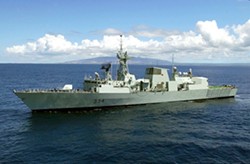First, some background. There are actually two ship building contracts at play, as detailed on the federal government's National Shipbuilding Procurement Strategy page.
One contract, for $25 billion, is for straight-up warships:
• six to eight Arctic/Offshore Patrol ships capable of "conducting armed sea-borne surveillance of Canada's waters, including the Arctic."The second contract, for about $10 billion, is for boats for the Department of Fisheries and Oceans and the Coast Guard. They are:
• Two, or possibly three Joint Support ships.
• Fifteen Surface Combatants, which will replace existing frigates and destroyers.
• An Offshore Oceanographic Science Vessel, which is a replacement for the very old (built 1963) CCGS Hudson, based out of BIO in Dartmouth.The two contracts are qualitatively different. One is for warships, one primarily (but not entirely) for scientific research. I don't have huge issues with the smaller contract---we need more, not less, scientific research.
• Three Offshore Fisheries Science Vessels, which will replace four boats now in use for scientific research.
• One Polar Icebreaker.
But there's a sad irony at play here: A big part of both contracts is related to the melting of the Arctic. All through the government's procurement announcements is language devoted to "strengthening Canada's Arctic sovereignty," which simply wouldn't be an issue if climate change wasn't making the Northwest Passage a navigable seaway that foreign nations say they have the right to use.
So on the one hand, the federal government is pursuing a fossil fuel-laden economic plan that directly speeds up the melting of the Arctic, and then on the other hand allocates billions of dollars in defence of that melting territory.
Still, you won't find me arguing against the scientific research components of the contracts. Although I do have an argument about how those research components are second-class citizens compared to the war machinery.
See, when it comes to the military components of the contracts, money simply isn't a worry. "The mission description [of the warships] is close to meaningless," reports Defense Industry Daily, and it appears the details will be worked out as the ships are being built. But the research ships are being nickeled and dimed down in capability, even before the contracts are awarded. As I reported earlier this year, 44 federal ocean-going researchers were so alarmed at the budget-cutting for a replacement for the Hudson, they took the unusual step of co-signing a letter to the ministers expressing their outrage.
The Harper government is making its priorities clear: Open chequebooks for warships, penny-pinching for scientific research.
Basing an economy on war
As for the warship component of the contracts, I often find myself in a conversation that goes something like this:
Me: I don't think we should be basing an economy on building stuff for war.Well, that's a good rhetorical comeback, but it doesn't really address my point: we shouldn't be basing an economy on building stuff for war. And, no, we should not want the money spent here, even if it's going to be spent somewhere else instead.
Friend: Yeah, sure, you unrealistic peacenik, I'll humour you and say in some perfect world we shouldn't be building stuff for war, but if the federal government is going to spend billions of dollars for war anyway, shouldn't we want them to spend it here?
Here's why.
Look, I recognize the context here, which is an impoverished provincial economy where people are having difficulty finding decent paying jobs. There's real hurt out there. And I don't envy premier Darrell Dexter's position, overseeing an economy taking multiple hits (still reeling from the 2008 recession, which is likely morphing into a lost decade or more of economic growth; the closure of NewPage and the resulting hit to the forestry industry; the inherited heavy provincial debt burden), none of them primarily his own doing. It no doubt makes immense political sense to support projects that will result in a boost in near-term employment: the convention centre, for example, and now the ship building contract.
And yes, there's no doubt building the convention centre will result in lots of immediate construction jobs, and in a narrow sense, increased employment at the convention centre itself after the new facility opens. My opposition to the convention centre has always been long term: the costs of operating the thing will outweigh any localized gain in employment, as the taxes needed to subsidize it will hurt economic performance across the province.
Similarly, if the Halifax yard lands one of the ship building contracts, it absolutely will result in big increases in local employment over the term of the contract, say, the next four years, safely past the next provincial election. But what happens after that? At that point, the winding down of federal contracts will serve as an anti-stimulus, bringing less outside money into the province and causing local businesses to cut their investments in new building and hiring. The economy starts suffering, with the economic indicators all heading south, even more so than they are at present.
Given no other changes in the local economy, there will be five options for workers after the contract is completed: they can become unemployed, collecting EI until it runs out; they could find some crappy paying service job with no benefits; they can move somewhere else where there might be better employment options, like the tar sands; they can join the military and get relatively well-paid work on the ships they just built; or they could build more military ships. So after the ships are built, the political pressure will be, hey, we've got this great shipyard here, we should be building stuff and putting people to work, let's build more ships. And since Canadian shipyards will never be able to compete against Asian yards for building ships for the private sector, that means building more Canadian warships.
This has been the logic of a military-based economy in all human societies across all of history: Preparing for war leads to more preparing for war, which in turn ultimately ends in war itself.
At both the federal and provincial level, our governments have been elevating the rhetorical importance of war. The Harper government is spending $28 million to celebrate the War of 1812 and, predictably, there's no shortage of pundits telling us that war was the "helped define who we are," that "Canada was born in War of 1812" and other assorted nonsense. Of course, just a few years ago we were told that it was Vimy Ridge that "forged Canada's identity as a nation separate from Great Britain." I guess the details don't matter---War of 1812, World War 1, whatever---the point is that Canada was borne through the bloodletting of war; war is at the heart of our identity as a nation.
But of course nothing is further from the truth. As John Ralston Saul points out at great length in Reflections of a Siamese Twin, Canada was actually created through a peaceful process that was the exact antithesis to war: the poor farmers of Upper and Lower Canada coming together to mutually redress their common complaints with British rule, and to forge ahead as a nation through negotiation, compromise and non-violence, and it is those values that have brought out the best in Canadians and best define this fine country.
Still, the myth of Canada being born through militarism and the on-going reframing of political discourse in militaristic terms serves a narrow political purpose of supporting an economic order that favours large capital investments that benefit large financial and industrial corporations over a more equitable economic order. This, incidentally, is why the Occupy movements resound so much with those left out of the equation.
And on the global scale, increased military spending is probably the worst way to deal with potential conflict; it's far better to prevent the causes of conflict in the first place. Certainly avoiding climate change will do more to make the world a safer place than all the warships we'll ever be able to build. And the biggest threat to world peace is an inequitable global economic order, but Canada refuses to meet its minuscule promises of foreign aid.
Another way
So if we're not going to build military ships as a route to prosperity, what should we do?
In part, that question misframes the issue; it buys into the "silver bullet" approach to economic development---that if only we hit on some mega-project that brings a lot of money into the province, we'll solve all our economic problems. I've been collecting a series of the absurd ideas that have been trotted out as our economic salvation through the years: the 10-reactor nuclear power plant at Stoddard's Island; the heavy water plant (built twice) at Glace Bay; the Clairtone Sound Corporation screw-up; the proposed Canso and Pittson oil refineries; the Mercator One cruise ship fiasco; the Commonwealth Games bid; turning downtown Halifax into the "next Singapore" and on and on and on. And now: we're going to build dozens of warships that will never be used in a war, no siree.
I'd like us to catch our collective breath, step back and admit something we don't like to talk about: Nova Scotia is a poor province. It's unfortunate, I agree, but it's the fact nonetheless; I don't like it any more than you. Despite a bunch of crap the economic development people spew out about our time zone, we're not greatly positioned geographically in the modern global economy, and with some minor exceptions we aren't blessed with significant oil or mineral resources. Tidal power has always been oversold, and even if it eventually gets developed, it won't be a significant contributor to the economy.
And those resources we once had---fish, timber, coal---have been or are being so mismanaged or not leveraged to their full potential, that they are now bringing diminishing returns.
What would happen, I wonder, if instead of looking for "silver bullets," we just assumed, for the sake of argument, that Nova Scotia is going to continue to be a poor province for, say, the next 200 years? How would this change our outlook, and what would we do differently?
Thankfully, we have a history that can help inform this view; through all our screw-ups, our mismanagements, our political corruption, shines a light that might give us some direction: the Antigonish Movement. I don't have time or space to detail the movement, and I wouldn't endorse everything about it for our present purposes, but it boils down to this: instead of looking for some outside influence to bring us prosperity (and notably, for the Catholics behind the movement, instead of embracing communism), we should develop institutions of self-reliance and cooperation that better spread the wealth we do have.
The modern day incarnation of the Catholic Antigonish Movement is the largely Buddhist-inspired GPI Atlantic; there are important differences between the two approaches, but at heart they share a vision of a more equitable society that values what's truly important. In neither vision does militarization play a role.
We won't ever be a rich province, but we can be a pretty good place to live, where people live fruitful and productive lives in a healthy environment with quality communities. I don't have all the answers, but they start with some pretty basic forms of economic development that share the wealth and build on our strengths: Reducing our reliance on imported energy, building local food networks, rebuilding our housing stock for energy efficiency and transforming our urban transportation system to one based on transit.
When we do these things, we'll find that, unlike building ships, the stimulus effects never end: our reduced costs result in on-going economic growth, forever.
















